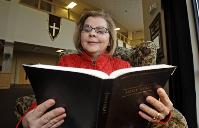By Annysa Johnson
Milwaukee Journal Sentinel
March 14, 2009
http://www.jsonline.com/features/religion/41267462.html
 |
| Pam Polinske, a member of Oak Creek Assembly of God Church, has become very active in her church since leaving the Catholic faith many years ago. “I carry my Bible around with me every day,” said Polinske, as she read outside the main sanctuary Friday. Photo by Rick Wood |
Pam Polinske is born again.
A practicing Catholic most of her life, the 52-year-old Franklin woman wandered spiritually after the death of her father in 1996. She visited nearly every Christian church in Franklin and neighboring Hales Corners before settling on Oak Creek Assembly of God on S. 13th St.
"I feel much more spiritually connected to this church than any other I've been to," Polinske said of the Evangelical church where she's worshipped for the last 12 years.
Polinske's is just one face behind a new study that shows significant shifts in the religious landscape in Wisconsin and the nation.
According to the American Religious Identification Survey released last week by Trinity College in Connecticut, the number of Wisconsinites who identify themselves as Catholics dropped from 39% to 29% of the population between 1990 and 2008, despite a 1% increase nationwide over that period and a similar uptick in Wisconsin since 2001.
At the same time, Wisconsin residents identifying themselves as other Christian faiths fell from 52% to 47%; non-Christian doubled from 2% to 4%; and those unaffiliated with any faith surged from 6% to 15% - painting a picture of a state that is growing less Christian and more secular. (The remaining 5% refused to respond or said they didn't know.)
Trinity surveyed 54,461 adults by telephone in English or Spanish, reporting a margin of error of less than 0.5%. Wisconsin's results were similar to those of surrounding states, though it appears to have grown less Catholic and more secular than Illinois.
Experts attribute the shifts to a number of factors, from migration and immigration to the sex abuse scandal in the Catholic church, the move away from mainline Protestant faiths toward Evangelical and non-denominational churches, and a growing suspicion about religious institutions in general, especially among the young.
"It's not going to be any single explanation," said Mark Silk, director of Trinity's Program on Public Values. "The trick is to try to figure out what the different components are and how they influence things."
In Wisconsin, for example, migration and immigration have likely played a role in both the fluctuating Catholic numbers and the doubling of those who identify as a religion other than Christian, according to researchers and religious leaders.
Wisconsin's Catholic parishes, like those around the country, have been bolstered by a growing Hispanic population, even as the loss of industrial jobs has sent some Catholics elsewhere seeking work.
 |
| Relgious affiliations shift |
And immigrants have increased numbers at local mosques, though that is not the only factor in the growth, said Othman Atta, president of the Islamic Society of Milwaukee. Muslims who were children in the 1990s now have families of their own, he said, and Muslims are more willing today to identify themselves as such.
"The community is maturing," he said.
Milwaukee Archdiocese spokeswoman Julie Wolf said the Catholic decline in the study doesn't jibe with the archdiocese's own membership numbers, which show an increase over that time, but added that the church's numbers aren't scientific.
Among the more significant shifts illustrated in the study, though they weren't broken out by individual states, were the decline among mainline Protestant denominations and the growth in the Evangelical and nondenominational churches.
Nationally, mainline Protestants represented about 12.9% of the population in 2008, down from 18.7% in 1990. Evangelicals and nondenominational Christians, on the other hand, grew from 5% to 11.8.%
Mark Braun, professor of theology at Wisconsin Lutheran College, said the strength of the Catholic and Lutheran cultures in Wisconsin has likely mitigated those trends here.
"Still," he said, "when you drive into some small towns in Wisconsin, you'll see the old Lutheran or Catholic church. But the one that's really thriving is the nondenominational church."
Individual congregations, church officials point out, often buck the trends.
While Catholic parishes in the central city might be struggling to hang onto members, some suburban counterparts are booming, said Wolf of the archdiocese.
Among mainline Protestant congregations in Milwaukee, both St. Paul's Lutheran and St. James Episcopalian churches said they're growing - St. Paul's because of its Laotian ministry and St. James because of its inclusive philosophies and outreach to the poor, according to the pastors.
The Rev. Debra Trakel, pastor at St. James, said members find what fits their spiritual needs at a particular church or they look elsewhere.
That bears out in the stories shared by dozens of Journal Sentinel readers elicited by an online query last week. Among those experiences:
A gay couple leave the Catholic and Lutheran churches, feeling unwelcome because of their sexual orientation, and continue to explore other faiths. A family with twin boys converts from Lutheran to Catholic in search of a more traditional service and "conservative" teachings. A woman leaves her Presbyterian church of 26 years for a Unitarian Universalist congregation, saying it fits more with her inclusive spiritual views.
In Oak Creek Assembly of God, Polinske sees everything she found wanting in the church of her youth, including an emphasis on the Bible.
Many spoke of abandoning their faiths altogether, a trend reflected in the Trinity College study.
Researchers at Trinity and elsewhere attribute that spike to a number of factors, including the politicizing of religion, a general skepticism toward institutions, and a kind of coming-out by those who
Any original material on these pages is copyright © BishopAccountability.org 2004. Reproduce freely with attribution.